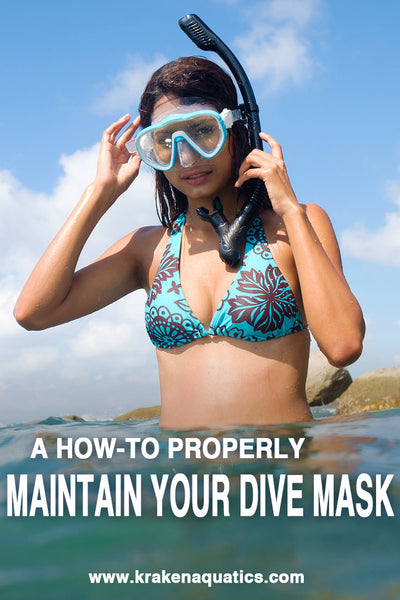
Your mask is one of the essential pieces of equipment that you need to take care of. It helps you see clearly the beauty of the underwater world. It is not just another fashion item. It’s a very important tool to use when snorkeling or scuba diving. For some, maintaining their mask simply means not breaking them. Actually maintaining your snorkel mask means more than that. There is a proper way to maintain your dive mask.
Taking care of your mask – before dive
- In the manufacturing process of the mask, there will be a thin layer of silicone that will remain on the glass lens. This layer of silicone can cause fogging in the mask. That means you need to remove that layer of silicone from the lens before your first dive. Read our blog post "How to pre-treat a new snorkel mask" for details on how to pre-treat your mask.
- Even after the layer of silicone is removed, there will still be some times that your mask will fog up. This normal fogging can be prevented by your saliva or by using anti-fog agents. Rub to the lens and rinse.
Tip: Some anti-fog agents contain substances like alcohol and formaldehyde that can damage the materials of the mask. So, it’s best to avoid long exposure of the anti-fog agent to your mask.
Taking care of your mask – during your dive
- When diving into the water, secure the mask by placing a hand over your lens. This helps to hold the mask securely and stay in place and endure the impact caused by entering the water.
- Do not leave your mask in dive staging areas. Big, heavy tanks and weight belts can be anywhere in the diving stage area and are a risk to falling and damaging your mask.
- Don’t rest your mask on your forehead during the dive. If you really want to remove your mask, let it hang around your neck. Otherwise, if you put it on your forehead, it could be dislodged and lost.
Taking care of your mask – after dive
- After every dive, soak your mask in warm fresh water to dissolve salt crystals.
- Using some warm soapy water, gently scrub the skirt of your mask. This helps remove the lotion you applied in your face. This can help maintain the integrity of your mask.
- Make sure to rinse your mask thoroughly. Then, dry it up using a towel before final storage.
Proper Storage
- Keep your dive mask in a cool and dry place. Also, make sure it is placed somewhere with no direct sunlight.
- If you put your gear inside your car, make sure to cover it with something (a cloth maybe) just so the heat of the sun won’t beat the gear.
Chemicals and Solvents
- Do not apply gasoline, aerosols, or chemical solvents to your mask as it can destroy the clearness of the lens and may damage the strap.
- Avoid using solvent or petroleum-based items to lubricate or clean any part of your mask.
- Store your mask away from gasoline or any oil. Better, store your mask in a dry box.
Getting the right mask
The first step to taking care of your mask is actually to choose one that fits you properly to begin with. Here are a few simple steps to ensure you get the right fit.
- Place the strap of the mask over the lenses.
- Then, put the mask on your face without putting on the strap. Make sure that the mask skirt is not folded over anywhere on the mask which will cause an air leak.
- Inhale through your nose as if you’re smelling a flower or a perfume. You should feel as if the mask is sucked on your face.
- While doing so, let go of the mask and then look down.
- Did the mask stay in place? If so, you got yourself the right mask. Did the mask got air into it and fell off? Then, that means the mask isn’t the right fit.
- If the mask seals well, then put on the strap and adjust it accordingly to the size of your head or until it is comfortable snugged.
Tip: If your mask is leaking, check out our blog post "Top reasons for a leaking dive mask and how to fix it" for some reasons that your mask might be leaking.
Take good care of your mask. While underwater, your mask is your best friend. It allows you to view the best of nature. So, take necessary actions to ensure your mask will last a long time and be with you for more water adventures!





